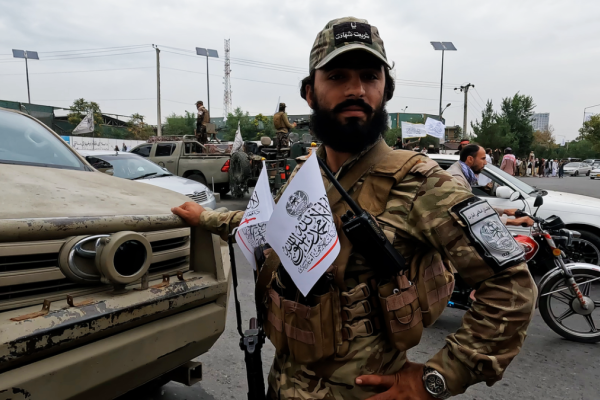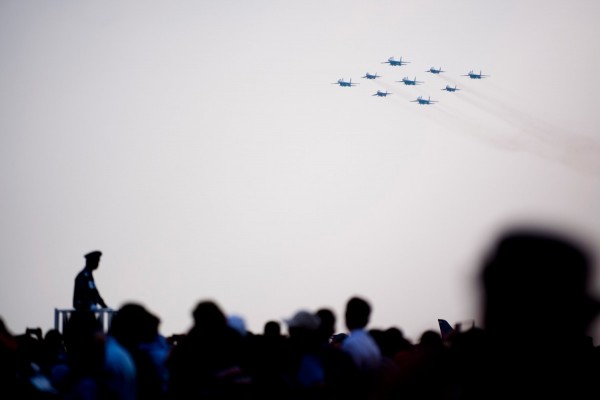Tanks not troops
For the military-industrial complex, the Ukraine-Russia war is foremost a convenient opportunity to sell weapons

A Leopard 2A4 tank from Lord Strathcona’s Horse (Royal Canadians) travels on the Black Route of the 3rd Canadian Division Support Base Garrison Wainwright Training Centre in preparation for Exercise MAPLE RESOLVE 21, on April 30, 2021. Photo by Sailor First Class Camden Scott/Canadian Armed Forces/Flickr.
After nearly a year into the Russian invasion of Ukraine, two things are now abundantly clear.
First, Western analysts, particularly those favoured by the mainstream media, are consistently wrong about the reality on the ground and cannot adequately explain either why Ukraine is not decisively winning, nor why Russia is not decisively losing.
Second, virtually nobody in the Western political or media establishment is advocating for peace.
This is a war that is costing hundreds of thousands of lives. Yet, for the military-industrial complex, the bloodbath is yet another fantastic opportunity to sell weapons.
The recent announcement that Canada will participate in the international effort to equip Ukraine with ever-more sophisticated military hardware is more proof of the same.
NATO countries—and other nations under the aegis of US power—are being pressured to empty out their stores of weaponry and donate them to the Ukrainian defence effort. Ottawa has even offered to acquire a Norwegian-made surface-to-air missile system for Ukraine’s use, despite the fact that the Canadian military lacks such a capability (and has been seeking to acquire one for some time).
And while the US has pledged to deliver dozens of their advanced M1 Abrams tanks, they likely won’t arrive until the end of the year. At the same time, the Biden administration remains loathe to commit its most advanced weapons systems to the conflict, particularly long-range missiles with the capability to strike deep within Russian territory.
The apparent logic in providing endless, albeit piecemeal, support is that it will likely avoid a direct conflict between NATO and Russia. But considering the amount of direct material and financial aid, not to mention training assistance and sanctions, a de facto state of direct warfare already exists, and has existed for some time. The odds of this conflict escalating out of control and into a nuclear exchange, either of a localized or humanity-ending nature, are higher now than at any time during (or since) the Cold War.
Predictably, Canada’s political establishment has failed in trying to walk the nations of the world back from the brink of calamity. So much for our apparent reputation for peacekeeping. Canada’s farce of a United Nations ambassador, Bob Rae, is an enthusiastic cheerleader for the conflict and has celebrated moves to ramp us arms shipments to Ukraine. In a demonstration of his apparent diplomatic skill, he denigrates peace activists as useful idiots.
Canada’s establishment media is no better, steadfastly refusing to publish anything that would cast doubt on the official NATO narrative about how this conflict started, about Ukraine’s less than stellar human rights and democratic record, or anything that is critical of Ottawa’s near total lack of interest in trying to bring the war to a negotiated end.
It often feels like the worldview of Canada’s political and media establishment is more grounded in the science fiction fantasyland of Star Wars—where good always triumphs over evil, and evil is cartoonishly incompetent—than the messy reality of a Russian military intervention in its own backyard.
NATO’s policy of sending tanks instead of troops demonstrates a few key points.
Irrespective of how popular it might be for Western leaders to talk tough about Russia, they know their popularity would likely plummet were they to propose sending in ground troops. It is worth noting that in the US, the isolationist Trump faction of the Republican Party often seems as opposed to the war as the nation’s left-wing. Strange days and stranger politics do indeed make the strangest bedfellows.
It isn’t surprising, either. A significant portion of Trump’s base consists of working class Americans, many of whom turned to the armed services for employment after the country’s manufacturing base was gutted by four decades of neoliberal economic policies. That base is far more interested in building tanks and other weapons systems for export than sacrificing another generation to interminable imperial adventurism.
Sending tanks instead of troops won’t stop the war, nor will it put an end to Putin’s regime. It’s also not going to convince anyone to negotiate for peace. Sending weapons is primarily good for business: NATO and other American allies will empty their stockpiles and then acquire the “next generation” of advanced weaponry, likely from American sources. There’s ample evidence this is already occurring. US arms sales increased by 50 percent in 2022. American weapons manufacturers, like Lockheed Martin and General Dynamics, are all reporting major increases in orders for weapons.
We’re not suing for peace because too many American jobs depend on constant arms sales (both foreign and domestic). Ukrainian blood isn’t being spilled for their freedom as much as it is to keep the American economy humming. At least 10 percent of American manufacturing was defense related in 2017, while more than half of the income taxes remitted to the US government are spent on Pentagon accounts. These numbers are likely higher today.
It is exceedingly immoral to profit off war, and far more so when politicians are doing all they can to prolong an unnecessary conflict at the behest of a belligerent national security state that seeks to assuage arms manufacturers with massive contracts. Yet here we are. And our political class knows full well that it would be politically suicidal to advocate for an actual commitment of ground troops to aid Ukraine. So they participate in the charade while the innocent Ukrainians caught in the middle continue to suffer.
There is the very real likelihood that this war escalates into something we won’t return from. This is the grim truth—never have we been so close to an actual nuclear exchange, and never have our so-called leaders acted so irresponsibly.
Prolonging the war with weapons shipments decreases the likelihood of a negotiated settlement as much as it increases the number of dead Ukrainians, precisely the group of people we’re told these weapons are supposed to ‘save’ from Russian tyranny.
There is no free market solution for peace when the military-industrial complex dictates our foreign policy.
Taylor C. Noakes is an independent journalist and public historian from Montréal. In addition to writing regularly for Canadian Dimension, he contributes to the Toronto Star, Jacobin, Cult MTL, The Maple, DeSmog, and the Montréal Review of Books, among others. He holds an MA in Public History from Duquesne University and has worked on the restoration of playwright August Wilson’s childhood home. He is also a frequent contributor to the Canadian Encyclopedia, and once debated several Canadian prime ministers at once on matters of foreign policy.










